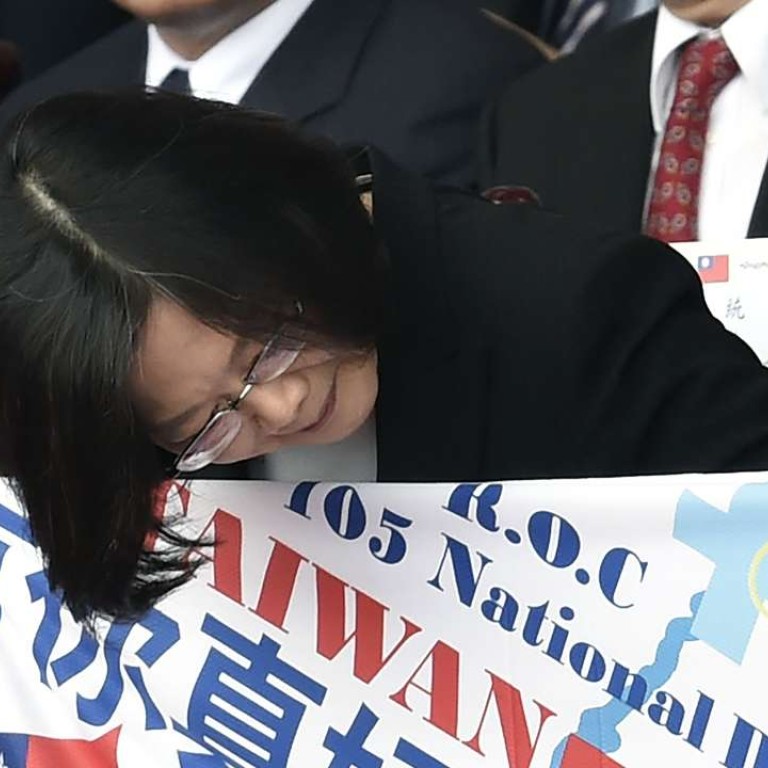
‘Ball in Beijing’s court’: Taiwan’s Tsai repeats call for cross-strait talks
Taiwanese president pledges consistent ties with the mainland but again stops short of recognising ‘1992 consensus’
Taiwan’s President Tsai Ing-wen used her first National Day address on Monday to again pledge to maintain peaceful ties with the mainland and call for a resumption in cross-strait talks.
Analysts said Tsai was trying to pass the ball back to Beijing but, without explicit recognition of the “1992 consensus” and its “one China” principle, it was unlikely the stalemate would end.
Beijing has stressed the need for the consensus since Tsai, of the independence-leaning Democratic Progressive Party, succeeded Ma Ying-jeou of the mainland-friendly Kuomintang as president in May. The consensus is an understanding reached by the two sides in 1992 for continued talks based on the understanding there is only one China, but each can have its own understanding of what that China stands for.
An Fengshan, from the mainland’s Taiwan Affairs Office, said that as long as Tsai could “recognise the historical fact of the 1992 consensus and its core meaning [one China], the two sides can hold talks on an equal basis”. “Otherwise, it is to incite cross-strait confrontation and cut the economic, social and cultural links between the two sides,” An said after the address.
While repeating her inauguration promise to maintain consistent, predictable and sustainable ties with the mainland, Tsai said her “pledges will not change, nor her goodwill, but we will not bow to pressure nor will we revert to the old path of confrontation”.
We respect the historical fact that in 1992 the two institutions representing each side across the strait held a meeting
“We respect the historical fact that in 1992 the two institutions representing each side across the strait held a meeting” that led to over 20 years of cross-strait interactions and talks, she said.
Analysts said that while Beijing considered the “1992 consensus” a bottom line, it was unacceptable to DPP members, especially those in the hard-core pro-independence camp. “Basically, the historic meeting and the [Taiwanese] constitution as well as the Taiwan and mainland areas mentioned by Tsai represent her goodwill, and it is unlikely she can go further,” Shih Cheng-feng, from National Dong Hua University, said.
Liao Da-chi, a political science professor at National Sun Yat-sen University in Kaohsiung, said Tsai had modified her position – instead of having no prerequisite for talks, she now welcomed dialogue as long as it was appropriate for people on both sides of the strait.
Addressing more the 10,000 people yesterday, Tsai said “anything can be included for discussion, as long as it is conducive to the development of cross-strait peace and the welfare of people on both sides”.
Liu Guoshen, director of the Taiwan Research Institute at Xiamen University, said there was nothing new in Tsai’s address – she had said the same things on various occasions, including in two recent newspaper interviews.
“This could be what she wanted to suggest – that there would be no surprise and no challenge from her,” Liu said.
If she wants to talk, she needs to address the issue of what the two sides of the Taiwan Strait stand for
“But if she wants to talk, she needs to address the issue of what the two sides of the Taiwan Strait stand for,” he said.
Tung Li-wen, a professor of public security at Central Police University in Taiwan, said Tsai’s offer to hold talks put the ball back in Beijing’s court.
Chang Wu-ueh, head of the China studies institute at Tamkang University in Taiwan, said the cross-strait situation would continue for some time because leaders of the two sides were focused on domestic issues.
Beijing has suspended talks and other official channels of communication with Tsai’s government since June in what was seen as a move to pressure Tsai into accepting the 1992 consensus. Relations between the two sides had been bitter since the end of a civil war in 1949, but warmed when the KMT’s Ma became president in 2008 and adopted a policy to engage Beijing and support the 1992 consensus.

